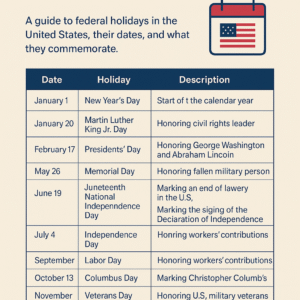
🎉 Introduction
Legal holidays in the United States serve both as a time of national reflection and as a practical element in the operation of government and law. In 2025, federal and state holidays continue to affect court schedules, government closures, and employee rights. This guide explains which holidays are recognized under federal law, how states differ, and what individuals and businesses should know.
Last Updated: June 23, 2025
Author: Nahyan | UsLawGuide.net
🕊️ What Is a U.S. Legal Holiday?
A legal holiday is officially recognized by law and typically results in the closure of government offices, courts, and many private businesses. Federal legal holidays apply nationwide, but states can recognize additional holidays.
There are two main types:
- Federal Legal Holidays (recognized across all states)
- State-Specific Legal Holidays (only observed in certain states)
Employers may or may not be required to provide paid time off depending on jurisdiction and company policy.
🌐 Federal Legal Holidays in 2025
These holidays are recognized across all 50 states. If a holiday falls on a weekend, it may be observed on the closest weekday.
| Date | Holiday | Observed On |
|---|---|---|
| Jan 1 | New Year’s Day | Wednesday |
| Jan 20 | Martin Luther King Jr. Day | Monday |
| Feb 17 | Presidents’ Day | Monday |
| May 26 | Memorial Day | Monday |
| Jul 4 | Independence Day | Friday |
| Sep 1 | Labor Day | Monday |
| Oct 13 | Columbus Day | Monday |
| Nov 11 | Veterans Day | Tuesday |
| Nov 27 | Thanksgiving Day | Thursday |
| Dec 25 | Christmas Day | Thursday |
These holidays affect
- Federal court closures
- Mail delivery (USPS)
- Banking hours
🌿 State-Specific Holidays (Examples)
States can designate their own legal holidays. Some examples include:
- Cesar Chavez Day (CA) – March 31
- Patriots’ Day (MA, ME)—April 21
- Confederate Memorial Day (AL, MS, SC)—April 22
- Emancipation Day (DC)—April 16
- Pioneer Day (UT) – July 24
- Nevada Day (NV)—October 25
State holidays can impact state courts, licensing bureaus, and public schools.
🔒 Legal Impact of U.S. Holidays
Courts
Federal courts follow the federal calendar. State courts may also close for state-recognized holidays.
Employment Law
- Federal law does not require private employers to give paid time off.
- Many employers observe major federal holidays.
- Union contracts or state laws may mandate paid holidays.
Contract Deadlines
If a deadline falls on a holiday, most courts and contracts extend the due date to the next business day.
❓ FAQ Section
Q: Are employers required to give time off on legal holidays?
➡ Not federally. Paid time off depends on state law or company policy.
Q: Do state and federal holidays always match?
➡ No. States may observe additional holidays not recognized at the federal level.
Q: Are courts open on federal holidays?
➡ No, federal courts are closed. Many state courts also close on legal holidays.
Q: What happens if a legal deadline falls on a holiday?
➡ The deadline usually moves to the next business day.
⚠️ Disclaimer
This article is for educational purposes only. Holiday observances, closures, and employment laws may differ by state or contract. Always consult local statutes or an attorney for official guidance.
🔗 Internal & External Links
External:
- https://www.opm.gov/policy-data-oversight/pay-leave/federal-holidays/
- https://www.dol.gov/general/topic/workhours/holidays
Internal (uslawguide.net):